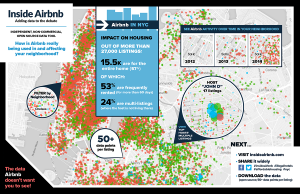The San Francisco Rent Board has published the minutes for its November 2015 meeting.
InsideAirbnb.com “Adds Data to the Debate” in Exploring the Effect of Airbnb on Neighborhoods
After spending $8 million dollars to defeat of San Francisco’s Proposition F, with some anticipating it will spend as much as $100 million next year to fight similar ballot measures, Airbnb is already in the process of organizing “grassroots lobbyists”, mobilizing its own users to work as advocates. Airbnb is planning on funding these “city-based guilds”, as well as providing them with Airbnb staff support, in an effort to fight similar legislation in other cities.
Meanwhile, the website InsideAirbnb.com has been “adding data to the debate”, by providing information, not only on the number of listings in a particular city, but also on whether the listing is for a single room or an entire rental unit. And this distinction is important where Airbnb and other hosting platforms have diverted a significant portion of housing units, compared to what has been made available to renters in recent years.
Federal Court Dismisses SFAA Challenge to SF Buyout Legislation
Following its removal of the lawsuit from State to Federal court, the City and County of San Francisco moved for judgment on the pleadings of the San Francisco Apartment Association’s challenge to the City’s new “buyout legislation”.
The SFAA challenged the legislation just days before its operative date, on several constitutional grounds. Judge Phyllis J. Hamilton of the U.S. District Court for the Northern District of California dismissed the case on the City’s motion, finding that the buyout legislation did not violate San Francisco landlords’ rights to free speech, due process, equal protection or privacy, ultimately characterizing the burdens under the legislation as reasonably related to the City’s legitimate interest in protecting tenants by remediating disparities in bargaining position. SFAA is appealing the decision to the Ninth Circuit.
“Jane Kim Amendment” Effective November 9th; Rent Board Publishes Necessary Forms
With the “Jane Kim Amendment” to the Rent Ordinance effective as of this Monday, the Rent Board has now published the required foreign language forms that must be served along with termination notices. You can read about other “Eviction Protections 2.0” requirements here.
Rent Board Publishes October 2015 Minutes
The San Francisco Rent Board has published the minutes for its October 2015 meeting, including its discussion of amending its Rules and Regulations to implement the Jane Kim Amendment to the Rent Ordinance. It also published its agenda for November 2015.
Alameda City Council Debate on Implementing Rent Control Turns Violent
The Alameda City Council held a debate this week on instituting rent control. Implementing rent control ordinances is becoming an increasingly popular idea in many Bay Area Cities (with some cities joining the ranks and others deferring on the issue).
The Alameda City Council decided to implement a moratorium on rent increases and evictions without just cause for 65 days, during which they will presumably be evaluating the effects on a city whose rents have increased 54% from 2000 to 2013, while its median household incomes for these renters have only increased by 29%.
The San Francisco Business Times reports that a man who attended the meeting to support tenants “became rowdy” (perhaps hoping for a longer term solution), received a bloody nose and had to be arrested. Landlord-tenant law in the Bay Area is a full-contact sport, apparently.
Unofficial San Francisco 2015 Election Results
While these tentative results are subject to change (as the remainder of the ballots are counted), the San Francisco Department of Elections has posted the unofficial results from last night’s election. No big surprises: Ed Lee is still Mayor, Airbnb’s $8 Million was apparently well spent defeating Prop F, with the issue of reforming short term rental law returning to the Board of Supervisors.
Former Supervisor Aaron Peskin defeated Ed Lee appointee Julie Christensen for the District 3 seat, which could mean efforts toward expansion of the applicability of the Rent Ordinance.
Anti-SLAPP Role Reversal in Olive Properties v. Coolwaters Enterprises, Inc.
The Second Appellate District’s decision, Olive Properties v. Coolwaters Enterprises, Inc., features an unusual role-reversal in the interplay of unlawful detainer actions and special motions to strike.
Special motions to strike under Cal. Code Civ. Proc., §425.16 (i.e., “anti-SLAPP motions”) are designed to defeat at the pleadings stage lawsuits that arise from “protected conduct”. The California Legislature views these lawsuits – Strategic Lawsuits Against Public Participation – as being more about chilling participation in public forums (e.g., petitioning a court for relief) than about litigating a claim.
Anti-SLAPP motions often come up in the context of evictions and derivative lawsuits following evictions. An unlawful detainer lawsuit proceeds on a unique, five-day summons (i.e., they move very fast through the courts, so a landlord can recover property and re-rent it in order to keep paying the bills).
The effect of this preference in the trial court is that only the causes of action based on unlawful detainer of property can be litigated in that initial lawsuit. Anything else (like a claim for breach of the lease where the remedy is something other than possession of the property, or a tenant’s claim for breach of the warranty of habitability or covenant of quiet enjoyment) must be litigated in a separate lawsuit instead of being joined in the unlawful detainer action.
Therefore, when tenants also have affirmative claims against their landlord, they will almost necessarily be litigated after the issue of possession is determined. And, where the landlord recovers possession, a tenant is wise to make sure their affirmative claims have absolutely nothing to do with the service of a termination notice or the lawsuit to recover possession, or else they are targeted at their former landlord’s privileged conduct in filing and prosecuting the eviction lawsuit.
Unusually in Olive Properties, the tenant filed their lawsuit first (alleging negligent interference with prospective economic relations and breach of the covenant of quiet enjoyment relating to their landlord leasing to another commercial tenant at a shopping center whose customers were using all of the available parking spaces). Meanwhile, the tenant failed to pay rent and CAM charges due under the lease – the basis for an unlawful detainer action based on non-payment of rent.
When the tenant moved to strike the unlawful detainer complaint, arguing that it was based on their filing of their general civil claims, the trial court denied their motion, citing the seminal anti-SLAPP case Navellier v. Sletten (2002) 29 Cal.4th 82, for the proposition that simply because a lawsuit is arguably triggered by another lawsuit does not necessarily mean that it “arises from” that lawsuit. The trial court awarded fees to the landlord, finding that the motion was intended merely to cause delay and adding that it “was a weak motion, at best, and an ordinary review of established legal authorities would have disclosed the inadequacies of the motion”.
The Court of Appeals affirmed, noting that “we publish our opinion in this matter to address the potential for abuse of the anti-SLAPP statute in unlawful detainer litigation”. Recent years have seen a trend against a mechanical application of the litigation privilege to all of landlord’s conduct surrounding a landlord-tenant relationship, simply because an eviction lawsuit was involved. (Moriarty v. Laramar Management Corporation (2014) 224 Cal.App.4th 125 comes to mind.) However, suing somebody for suing you will surely always be met with a successful anti-SLAPP motion.
Olive Properties is also noteworthy for its use of a motion for calendar preference at the appellate level. While the five-day summons and twenty-day trial setting move an unlawful detainer action through the trial courts quickly, these actions can slow down considerably on appeal. The California Legislature expressed its preference for unlawful detainers over most other civil matters in California Code of Civil Procedure, section 1179a. The landlord was able to successfully move the appellate court to accelerate the appeal in this action by invoking section 1179a.
UBS “Bubble Index” Views San Francisco as “Overvalued”
The UBS Global Real Estate Bubble Index report assesses the risk of price corrections in real estate prices in global financial centers, evaluating home prices and rents, tracking historical figures, in the context of wages and the economy generally. In its 2015 report, UBS noted that, “When inexpensive financing is combined with bullish expectations, real estate prices eventually uncouple from the real economy”. It identifies San Francisco prices as “overvalued”, finding it to have the highest risk of price correction for any American city.
Bisnow Reviews Five SF Propositions That Would Affect Real Estate
Bisnow reviews Proposition A (affordable housing bond), Proposition D (Mission Rock development), Proposition F (Airbnb regulation), Proposition I (Mission Moratorium part 2), and Proposition K (development of surplus City property), all of which will have an effect on San Francisco real estate.
And remember to mark your calendars for election day this November 3rd.






